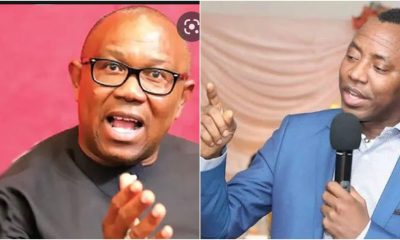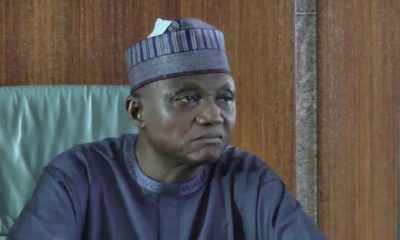News
Four months after pardon, Dariye, Nyame released from prison

Two former state governors, Joshua Dariye of Plateau and Jolly Nyame of Taraba, have been released from the correctional facility in Kuje council area of the Federal Capital Territory (FCT).
This is coming about four months after the former governors were granted state pardon.
Dariye and Nyame were among 159 inmates pardoned at a council of state meeting presided over by President Muhammadu Buhari in April.
The two former governors, jailed for fraud, were granted pardon on the grounds of age and ill health.
Nyame was convicted in 2018 and given 14 years imprisonment for diverting public funds, but his sentence was later reduced to 12 years in 2020, following a ruling by the supreme court which affirmed the judgment of the court of appeal on the matter.
On his part, Dariye was sentenced to 14 years in prison for N1.126 billion fraud, but his jail term was reduced by four years, following a verdict by the supreme court affirming an earlier judgment by the court of appeal.
Dariye, who was prosecuted by the Economic and Financial Crimes Commission (EFCC) for N1.16 billion fraud, was on June 12, 2018 sentenced to 14 years in prison for criminal breach of trust and two years in addition for misappropriation of public funds, both to run concurrently.
Justice Adebukola Banjoko of the FCT court before, whom he was standing trial for a 23-count amended charge, found him guilty of 15 of the counts bordering on criminal breach of trust, misappropriation of public funds but discharged him on eight.
READ ALSO:
- Singer Kizz Daniel arrested in Tanzania
- Three killed in Washington DC lightning strike – was climate change to blame?
- I Left APC Because My Rival At Primaries Abused My Father – Buhari’s Nephew
Dariye was first arraigned on July 13, 2007 at the High Court after which he proceeded to the Appeal court with an application to quash all the charges but were all dismissed.
The court ordered accelerated hearing of the fraud case against him, thus necessitating the continuation of trial on January 25, 2016, before Justice Banjoko.
In addition to his sentencing, Justice Banjoko also ordered that the N80 million recovered by the EFCC be forfeited to the state government’s coffers.
The state pardon had generated controversy, with some persons insisting it would not send the right message on the fight against corruption.
However, the presidency had defended the decision, saying it was done in the interest of fairness.
Presidential spokesman, Garba Shehu, had said, “While it is natural that the cases of the ex-governors — two among many — would excite political analysts, coming at a time when elections are in the air, the President would at the same time have come across as insensitive and cruel to most people were he to have ignored very compelling cases recommended for pardon made to him because someone is a former Governor.
“Even Governors have the right to be treated fairly under the law. President Buhari assures the nation that nothing done here was intended to achieve a political end or send a revisionist message on the relentless war against corruption which he has ably and evidently led by personal examples.”
News
Executive Secretary FCDA Hadi Ahmad suspended indefinitely

Executive Secretary FCDA Hadi Ahmad suspended indefinitely
Executive Secretary, Federal Capital Development Authority FCDA, Engr. Shehu Hadi Ahmad, has been suspended indefinitely.
His suspicion was on the order of the Minister of the Federal Capital Territory, Nyesom Wike.
Senior Special Assistant on Public Communications and New Media to the Minister, Lere Olayinka, disclosed this in a statement on Thursday evening.
No reason was given for the suspension.
Ahmad was directed to hand over to the Director, Engineering Services in the FCDA.
The statement read: “The Executive Secretary, Federal Capital Development Authority FCDA, Engr. Shehu Hadi Ahmad, has been suspended indefinitely.
“According to a statement on Thursday, by Lere Olayinka, Senior Special Assistant on Public Communications and New Media to the Minister of Federal Capital Territory FCT, Nyesom Wike, the suspension of Engr Hadi Ahmad is with immediate effect.
“The suspended Executive Secretary has consequently been directed to hand over to the Director of Engineering Services, Engr in the FCDA.”
News
Just in: Rivers, Anambra high court judges suspended for one year

Just in: Rivers, Anambra high court judges suspended for one year
The National Judicial Council (NJC) has suspended two state high court for over acts of professional misconduct.
The NJC named the affected judges as Justice G. C Aguma of the High Court of Rivers State and Justice A.O Nwabunike of the Anambra State High Court.
They were both suspended for the period of one year without pay and thereafter placed on watch list for two years.
The decision was taken at the 107th Meeting of the NJC chaired by the Chief Justice of Nigeria, Hon. Justice Kudirat Kekere-Ekun on 13 and 14 November 2024.
A total of five serving judicial officers were sanctioned for various acts of misconduct.
The Council also recommended two Heads of Court for compulsory retirement over falsification of age.
The duo of the Chief Judge of Imo State, Hon. Justice T. E. Chukwuemeka Chikeka and the Grand Kadi of Yobe State, Hon. Kadi Babagana Mahdi, were recommended for compulsory retirement for falsification of their ages.
The Council considered the Report of its Preliminary Complaints Assessment Committee, which considered a total number of 30 petitions, empanelled six committees for further investigation.
Twenty-two cases were dismissed for lacking in merit, two were sub judice.
The Council also empanelled a committee to investigate all complaints and petitions against Hon. Justice O. A. Ojo, Chief Judge, Osun State.
News
FG announces plans to borrow N13.8tn for 2025 budget

FG announces plans to borrow N13.8tn for 2025 budget
ABUJA—THE Federal Executive Council (FEC) yesterday approved a budget proposal of N47.9 trillion for the 2025 fiscal year and borrowing of N13.8 trillion.
The Minister of Budget and Economic Planning, Atiku Bagudu, disclosed this while briefing State House correspondents, at the end of the Council meeting, presided over by President Bola Tinubu at the Presidential Villa, Abuja.
The approval is part of the Medium Term Expenditure Framework, MTEF, and Fiscal Strategy Paper, for 2025-2027, by the Fiscal Responsibility Act of 2007.
The framework is expected to be submitted to the National Assembly as required by law, either on Friday or Monday.
Bagudu outlined several key parameters that will guide the 2025 budget based on economic projections and government priorities. These include a projected Gross Domestic Product (GDP) growth rate of 4.6% for 2025, an oil price benchmark of $75 per barrel and an exchange rate of N1.400 to $1.
Additionally, the government anticipates oil production at 2.06 million barrels per day.
In terms of fiscal strategy, the budget assumes that the government will borrow approximately N13.8 trillion — about 3.87% of the GDP — to fund key infrastructure projects and economic initiatives.
Bagudu emphasized that this borrowing is part of a strategic plan to balance government spending with sustainable debt management.
The Minister further noted that “the Nigerian economy is showing signs of resilience, with a 3.19% growth rate recorded in the second quarter of 2024.
READ ALSO:
- We didn’t arrest Hamdiyya Sidi for criticising Sokoto governor – Police
- Four varsity lecturers dismissed for sexual misconduct
- Super Eagles seal AFCON 2025 spot, draw 1-1 against Benin
This growth is expected to continue through 2025, driven by efforts to tackle inflation and stabilize key economic sectors.”
Bagudu lists the aims of fiscal policies
He stressed that the Federal Government’s fiscal policies are aimed at strengthening economic resilience, continuing to address inflationary pressures, and providing more targeted support to drive long-term growth.
Bagudu also highlighted that the implementation of the 2024 budget was progressing well, with significant improvements in revenue collection and expenditure management, despite some delays in achieving pro-rated targets.
“Non-oil revenue streams, in particular, have performed better than initially expected, showing promising progress.
The N47.9 trillion proposed budget for 2025 includes various provisions, particularly in areas such as infrastructure development, social programs, and critical national projects.
Bagudu also revealed that for the first time, the government’s budget will include contributions to the development commissions that had recently been passed or were in the process of being passed by the National Assembly.
“These measures are designed to strengthen the country’s social and economic development at the grassroots level.”
He further noted that the federal government is committed to ensuring that the 2025 budget is passed and signed into law before December 2024, in order to create a predictable fiscal environment and adhere to the January-December budget circle that the administration aims to implement moving forward.
In addition to approving the 2025 budget, the FEC also endorsed the 2025-2027 Medium Term Expenditure Framework, MTEF, and Fiscal Strategy Papers, FSP, which outline the government’s long-term fiscal policies and strategies for achieving sustainable growth.
These documents will now be sent to the National Assembly for further review.
Bagudu emphasized that the MTEF and FSP provided the necessary roadmap for the government’s fiscal policy over the next three years, ensuring that public finances remained on a sound footing and that economic growth targets were met.
He expressed confidence that Nigeria’s economic trajectory was moving in the right direction, with positive growth recorded in key sectors.
He stressed that the government’s macroeconomic policies, particularly in the areas of market-driven pricing for petroleum products and foreign exchange, are contributing to the country’s overall economic stability.
“The fiscal efforts are on track, and we are confident that with these strategic investments and reforms, Nigeria will continue to make progress toward a more resilient and sustainable economy,” he declared.
Experts fault govt’s budget assumptions
Economy experts who spoke to Vanguard, however, faulted the budget assumptions, describing some of them as too aggressive.
In his comment, David Adonri, Analyst and Executive Vice Chairman at Highcap Securities Limited said : “One thing that bothers me is the failure of FGN to attach a report of the performance of the previous budget while seeking for approval of the new budget.
“Historical antecedents will let us know whether the assumptions underlying the new budget are reasonable.
“How will FGN finance the budget? Is it still a deficit budget like on previous occasions? There is nothing on ground to indicate that GDP growth rate of 4.6% is attainable in 2025.
“The omission of the forecast for inflation is questionable because the intended GDP growth may just be an inflationary growth which is akin to motion without movement.
“With Donald Trump’s agenda to release more fossil fuel from 2025, the crude oil price forecast may be misleading.
‘Finally, predicating the budget on a crude oil-driven economy shows that budgeting by FGN has not departed from past ruinous economic philosophy.
“It is too pedestrian for a country that should be inward-looking and focused on the mobilization of the idle factors of production in the country.”
On his part, Tunde Abidoye, Head of Equity Research FBNQest Securities Limited, said: “I think that some of the assumptions are a bit aggressive.
“The oil production benchmark of 2.06mbpd looks very ambitious given the current realized oil production level of around 1.3mbpd (ex-condensates), per NUPRC data.
“The exchange rate and GDP growth rate projections are also a bit optimistic given the current exchange rate is N1,650, and the strain on household wallets.
“However, although I think the oil price benchmark is realistic, there are potential downside risks arising from the anticipated ramp up of oil production by the US following President Trump’s victory at the polls.”
Also commenting, Clifford Egbomeade, Public Affairs Analyst/ Communications Expert, said: “The proposed 2025 budget of N47.9 trillion, based on a $75 oil benchmark, 2.06 mbd production, and 4.6% GDP growth, sets ambitious targets given Nigeria’s economic climate.
“The oil production target assumes steady output levels, which may be impacted by infrastructure limitations. Moreso, the projected 4.6% GDP growth may be optimistic, as Nigeria continues to face high inflation, currency pressures, and unemployment.
“The budget includes N9.22 trillion in new borrowing, raising concerns about fiscal sustainability given the nation’s current debt servicing load. “The assumed exchange rate of N1,400 per dollar suggests continued devaluation, which could intensify inflationary pressures. Achieving this budget will require effective fiscal reforms and greater economic diversification to meet revenue and growth targets.”
Dissecting the proposed budget, Port Harcourt-based energy analyst, Dr. Bala Zakka, said: “Oil market is very volatile and absolute caution should be taken in the process of taking the benchmark price for the 2025 budget.”
On output, he said: “The federal government said it is currently producing 1.8 million barrels per day, including condensate. Like in the case of price, adequate caution should also be taken here. I strongly believe that stakeholders, including the government and investors should work harder to further increase the nation’s capacity to produce oil and gas.”
“The Gross Domestic Product, GDP, is all about the production of goods and services in an economy. With constant power supply disruptions, it has not been possible for households and businesses to participate in the economy. It is very doubtful if they will be able to increase investment to produce goods and services in 2025.”
FG announces plans to borrow N13.8tn for 2025 budget
-

 Sports17 hours ago
Sports17 hours agoBREAKING: Super Eagles qualify for AFCON 2025
-

 Aviation19 hours ago
Aviation19 hours agoDisaster averted as bird strike hits Abuja-Lagos Air Peace flight
-

 Railway3 days ago
Railway3 days agoNigerian railway adds extra train to Friday, Saturday trips on Lagos-Ibadan route
-

 International3 days ago
International3 days agoUK announces 45,000 seasonal worker visas for 2025
-

 Education2 days ago
Education2 days ago12-year-old Nigerian girl Eniola Shokunbi invents air filter to reduce spread of diseases in US schools
-

 Business3 days ago
Business3 days agoTop 5 crypto apps that work with Nigerian Bank accounts
-

 Politics2 days ago
Politics2 days agoWhy I can’t form coalition with Peter Obi – Sowore
-

 metro4 hours ago
metro4 hours agoCourt orders varsity to pay lecturer N40m compensation for wrongful dismissal












